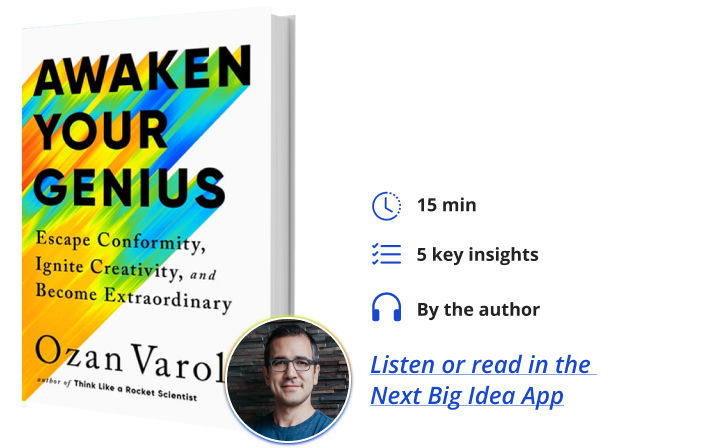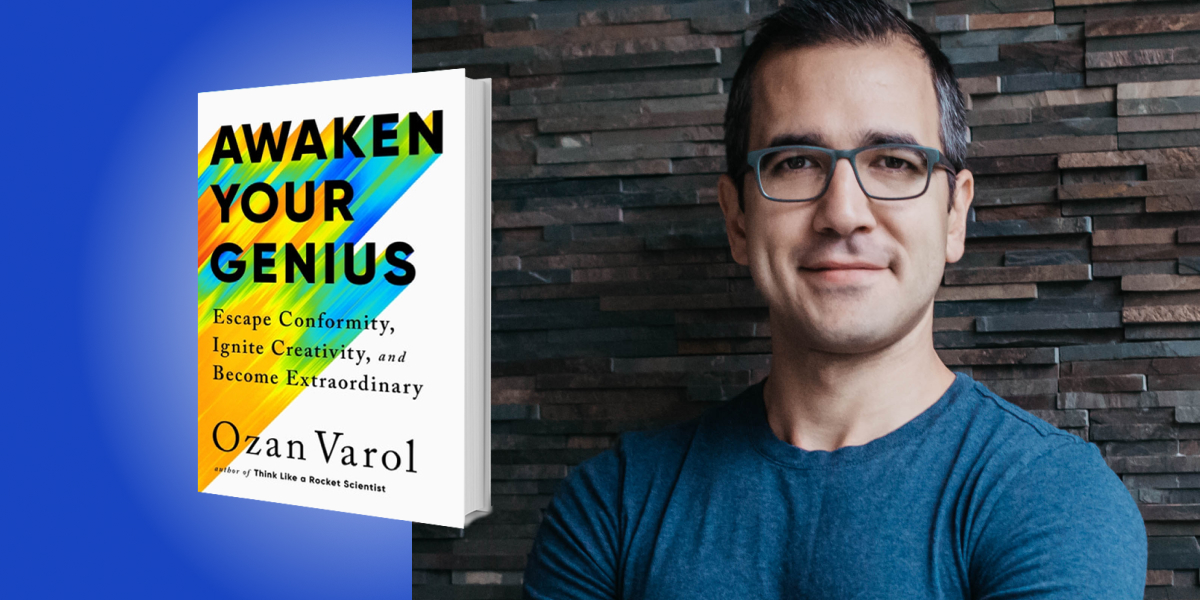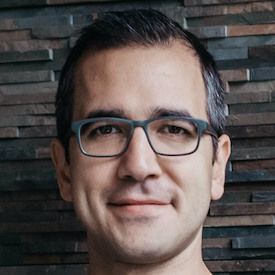Ozan Varol is a rocket scientist turned award-winning professor and bestselling author. A native of Istanbul, Turkey, Ozan moved to the US at 17 to attend Cornell University and major in astrophysics. While there, he served on the operations team for the 2003 Mars Exploration Rovers project that sent two rovers to Mars. Ozan then pivoted and became a law professor to influence others to make giant leaps on Earth. His work has been featured widely, including The Wall Street Journal, Newsweek, BBC, TIME, CNN, and the Washington Post.
Below, Ozan shares five key insights from his new book, Awaken Your Genius: Escape Conformity, Ignite Creativity, and Become Extraordinary. Listen to the audio version—read by Ozan himself—in the Next Big Idea App.

1. Embrace your idiosyncrasies.
Bruce Springsteen has had an incredible career spanning six decades. What makes him extraordinary? It’s not his voice. He readily admits that his voice isn’t amazing. He can play the guitar, but “the world is filled with plenty of good guitar players, many of them my match or better,” he writes in his excellent memoir, Born to Run.
Instead of aiming for the same target as other musicians—trying to out-sing or out-play them—Springsteen doubled down on the quality that made him unique: His ability to write song lyrics. Springsteen became a sensation for writing lyrics that capture the blue-collar spirit, that show the distance between the American dream and the American reality, and that allow his audience to find pieces of themselves in his music. The same man initially dismissed by audiences, agents, bandmates, and just about everyone else eventually became a rock ’n’ roll sensation.
Springsteen did what Brian Eno, another extraordinary musician, advises. People often want to “aim for the biggest, most obvious target, and hit it smack in the bull’s eye,” Eno says. “Of course with everybody else aiming there as well that makes it very hard to hit.” The alternative? “Shoot the arrow, then paint the target around it,” Eno explains. “Make the niches in which you finally reside.”
Stop aiming for the same obvious target as everyone else. Figure out your first principles—your talents, interests, and preferences—and paint the target around them. Your first principles are often the qualities you suppress the most because they make you weird or different. At some point, you were probably shamed for embodying those qualities, so you learned to conceal them.
But here’s the thing: We notice things because of contrast. Something stands out because it’s different from what surrounds it. If you blend into the background—if you show no idiosyncrasy, no fingerprints, no contrast, no anomaly—you become invisible. You become the background. It’s only by embracing rather than erasing your idiosyncrasies that you can become extraordinary.
2. Ask smarter questions.
When I first became a professor, I’d pause from time to time during class and ask, “Does anyone have a question?” Nine times out of ten, no one would raise their hand. I’d move on, confident that I’d done a stellar job explaining the material.
I was wrong. The exam answers made it clear that there were plenty of students who weren’t getting it. So I decided to run an experiment. Instead of asking, “Does anyone have any questions?” I began to say, “The material we just covered was confusing, and I’m confident there are plenty of you with questions. This is a great time to ask them.”
The number of hands that went up increased dramatically. I realized that “Does anyone have any questions?” was a stupid question. I had forgotten how hard it is for students who pride themselves on intellectual powers to admit that they didn’t understand something in a crowd of peers.
“It normalized confusion and solicited the outcome I was looking for.”
My reframed question made it easier for students to raise their hands. It normalized confusion and solicited the outcome I was looking for—which is more questions from students.
We ask stupid questions all the time outside the classroom. If you ask a team member, “Are you facing any challenges?” most will say no. They might fear that their admission will be seen as a weakness. You’re more likely to get an honest response if you say, “We just finished a tough quarter. Everyone is facing significant challenges. I’d love to hear about yours.”
Breakthroughs, contrary to popular wisdom, don’t begin with a smart answer. They begin with a smart question that solicits a more insightful answer.
3. If you’re not in possession, get in position.
My high school soccer coach had a saying that I love: If you’re not in possession, get in position. In other words, if you don’t have the ball, move to a different place on the field where you’ll be open to receive the ball.
The same principle applies to you. Far too often, we sit in the same room, in the same position, facing the same computer, for hours at a time. When we’re stuck physically, we often get stuck creatively.
Our beliefs, perspectives, and habits are tied to our environment. Change your environment, and it becomes easier to dislodge what’s no longer serving you. This is why many smokers find it easier to quit when they’re traveling. Their new environment doesn’t have the same smoking associations as their home.
“Change your environment, and it becomes easier to dislodge what’s no longer serving you.”
If I’m in a creative rut, I move outside of the room where I normally write—which is associated with the same old thought patterns. I bring my laptop with me to an entirely different room—with different decorations, different books on the shelves, different energy, different everything.
That minor shift in location brings a major shift in perspective. It forces a reset in my mind. It creates a blank space where I can project new ideas. Ideas that were obscured by the old setting begin to reveal themselves in the new. If you’re feeling stuck—if you’re finding it hard to solve a problem or get started on a daunting project—physically move to a different place where you can get unstuck.
4. Stop calling your office an office.
There’s a room in our home that I’ve called my “home office” since we first moved in. I had no good reason for the name—other than an “office” is what people conventionally call a room where work is supposed to get done.
But in my mind, an office is where good ideas go to die. An office conjures images of cubicles, mind-numbing water-cooler conversations, half-empty cups of awful coffee, and headache-inducing fluorescent lights. Creativity, in other words, hates offices.
So instead of calling my room an office, I started calling it an idea lab. An idea lab is where innovative ideas are born. An idea lab involves experimentation. An idea lab is for daydreaming. I love my idea lab (and I hated my office).
You might be wondering: What’s in a name? Who cares what a room is called? Names matter. This is called priming. Mere exposure to a word or image can have a powerful influence on your thinking.
And the importance of naming extends far beyond your office. Don’t call it a status meeting. Call it something that inspires the attendees to show up in a way that will move the needle—a visioning lab, a collaboration cave, or an idea incubator.
“If you want unconventional results, pick an unconventional name.”
Don’t call it a to-do list. Call it a playlist or a design list—a title that will delight you and pull you in. If you want unconventional results, pick an unconventional name. Find your own words that ignite your imagination and prime you for what you’re trying to achieve.
5. Think before you research.
We’ve lost touch with one of the most basic human experiences—thinking. We beg for answers, like Tolstoy’s fabled beggar pleading for pennies from passersby while unaware that he’s sitting on a pot made of gold. Instead of digging deep into our core to find clarity, we outsource life’s most important questions and extinguish the fire of our own thoughts.
Overcoming this tendency requires unlearning the habit—programmed into us in school—of immediately looking to others for answers and instead becoming curious about our own thoughts.
Let’s say you’re curious about where good ideas come from. Instead of jumping on Google, or even reading relevant books, think about the question first on your own. Search inside your own mind, mine it for relevant ideas, and jot them down. If you reverse the order—if you think after you read—other people’s opinions will exert too much gravitational pull on your own. Captured by their orbit, you won’t reach escape velocity. Your own ideas will end up deviating only marginally, if at all, from what you’ve read.
After you’ve gone deeper on a question by thinking about it yourself, turn to reading what others have written about it. But don’t pause your own thinking. When we read, we often don’t engage with what we read. We see through the author’s eyes, instead of our own. We passively absorb their opinions without thinking for ourselves. As a result, reading becomes a way of shirking responsibility.
Underlining or highlighting passages in what you read isn’t enough. It’s also not enough to ask, What does the author think? You need to also ask, What do I think? Where do I agree? Where do I disagree? Your own depths aren’t a place to escape reality. They’re a place to discover it.
To listen to the audio version read by author Ozan Varol, download the Next Big Idea App today:































